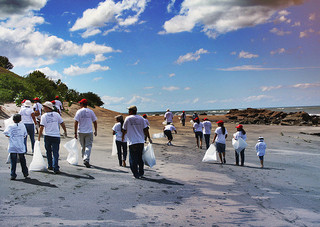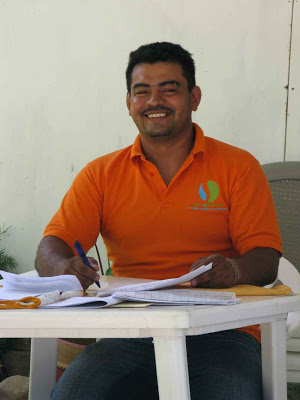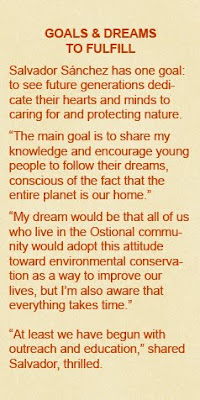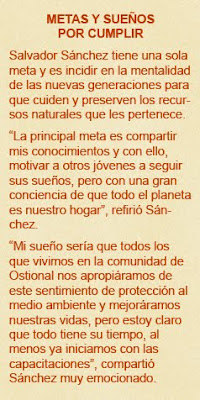


For more than two decades, poachers raided every single sea turtle nest on the beach in Ostional, a small fishing village along the Nicaragua’s southern Pacific coast.
Determined to change that, we came up with a system of incentive payments to reward individuals for finding, reporting, and protecting turtle nests, and additional incentive payments to reward the community at large for supporting our conservation efforts.
How’s that commitment to voluntary solutions working out for us?
Meet the first baby sea turtles to hatch on the beach in Ostional in 25 years!



“The Plan establishes the profiles for projects to be developed in a 1,600 kilometer-long geographic area which links three countries’ landscapes, ecosystems, habitats and cultures, the local Environment Ministry (Semarena) announced today.”
Reported in Dominican Today
We’ll be watching!
Picking up Rick Smith’s recent piece at National Parks Traveler, EcoLocalizer has posted about our turtle rangers and community-based conservation programs:
Paso Pacífico, a non-profit organization focusing on the Pacific slope of Central America, is helping endangered Hawksbill Turtles in Nicaragua with a compensation-based conservation program based on incentive payments for local people. The financial rewards to locals in exchange for protecting endangered sea turtle nests are making a difference: Rangers have reported that egg poaching is on the decline. And Paso Pacífico plans are to make this program sustainable.
You can see the EcoLocalizer piece here.
Published earlier this year, two economists published a paper in the BioOne Online Journal:
The use of performance payments to achieve conservation outcomes is increasingly being used as an alternative to traditional regulatory and development-based approaches in low-income nations. Although payments are increasingly common in terrestrial species and ecosystem conservation initiatives, they are rare in marine conservation efforts such as sea turtle protection. This paper describes sea turtle incentive payment initiatives taking place around the world, most of which are found in projects focusing on nesting beach protection. We find that many of these initiatives have achieved substantial results for a very low annual cost.
You can read the full abstract online and scroll down to find a map of market-based programs around the world. You’ll see we are the only program in Central America.
Fire can shape landscapes, shift climate and even change processes such as the carbon cycle–blazes have impacted the planet for eons. But now, people could be shifting the balance in a new direction.…While fires may burn locally, their consequences spread globally. When forests blaze, carbon stored in vegetation escapes into the atmosphere as carbon dioxide, a greenhouse gas. Added up, the fires that burn all over the world could be a significant source of atmospheric carbon, even contributing to climate change.…“Our calculations show that forest fires could account for one-fifth of the greenhouse gases produced by humans,” [Jennifer] Balch says.…Besides releasing heat-trapping carbon dioxide, fire contributes to climate change by releasing aerosols, or black soot. Soot can warm the atmosphere by absorbing solar radiation.…Fire is such a large source of carbon that it should be incorporated into predictions of climate change, researchers note.
 From humble origins, Salvador Sánchez, was elected as a community leader in the small fishing village of Ostional, near San Juan del Sur, became a conservationist, and is now a respected leader and successful entrepreneur. This is his story.
From humble origins, Salvador Sánchez, was elected as a community leader in the small fishing village of Ostional, near San Juan del Sur, became a conservationist, and is now a respected leader and successful entrepreneur. This is his story.
(Adapted from the Spanish piece written by Adelayde Rivas Sotelo)
Natural Leader
Ostional is a small fishing community 24 kilometers south of the San Juan del Sur Harbor, in Rivas, Nicaragua’s southwestern-most province. Ostional is nestled at the edge of the tropical dry forest where it meets the rocky Pacific coastline.
In recent years, the 300 families of Ostional have watched as the wildlife and landscape have been threatened and degraded by deforestation, fires, and pollution.
Ostional also counts among its inhabitants an entrepreneur and popular community leader by the name of Salvador Sánchez. At 32, Salvador has earned the confidence of everyone in Ostional, young and old. They all respect and admire his efforts to improve their community.

The youngest of ten children, Salvador is passionate about the pursuit of knowledge. He studied mechanical engineering, but dropped out for various reasons.
“Thanks to my brother, Jose Maria Sanchez,” Salvador shares. “I was motivated to organize people. He became a deputy. I wanted to understand policy procedures and work for the people of my community.”
Becoming an Environmental Leader
In 1996 Salvador Sánchez grew concerned about sea turtles. “I witnessed the poaching of turtle eggs. I couldn’t make sense of what was happening around me, because I didn’t have to take turtle eggs to survive,” Salvador explains. So he asked himself “why did anyone else?”
That’s when Salvador began to investigate environmental law. Then, with the help of his brother, the deputy, he started his career as an elected official, running on an environmental platform, and working to protect sea turtles, eliminate trash, slow deforestation, and minimize beach pollution.
“I felt a need to work on these issues” Salvador says “and then a year ago I came across an NGO called Paso Pacífico, which helped me actualize some of these projects.”
Capacity Building: Investing in Our Future
Eager to become an effective leader, Salvador Sánchez enrolled courses on conflict resolution and watershed management. This dedication to learning earned him the respect of the community.
“For me, training is very important because it allows me to know and understand many issues better than I did before. I now see and appreciate much more that we Nicaraguans have,” Salvador explains.
He talked about his recent participation in a seminar on the Effective Management of Protected Areas. He and his colleagues hosted a group of rangers from all over Nicaragua and Costa Rica and shared their experiences on the subject.
“The project was funded by Paso Pacífico Este thanks to support from foreign agencies, like USAID. In turn, we’ve opened doors to young entrepreneurs in Ostional, because we can further transmit the knowledge and information.”
Currently, Salvador Sánchez directs Paso Pacífico’s team of rangers in the Ostional area. Together, they are charged with a reforestation program, and preserving the natural resources of Nicaragua’s Pacific Coast.
“The functions of my role include managing the ranger program, the incentive payments for conservation, environmental education, and reforestation.”
Sánchez saids that education is the best way to raise awareness in children and young people. “It’s hard to change attitudes among the old, but for young people it’s not too late.”
Tourism Entrepreneur
In parallel to his position as a professional conservationist, Salvador and his wife Carolina along with their son Diego, run a small bed and breakfast for tourists visiting Ostional.
“Before taking the job with Paso Pacífico, I built two small cabins near the sea, where we offer food and lodging, and area tours. We offer dive tours, kayaking, and birdwatching expeditions.”
Salvador has managed to demonstrate that the right approach to sustainable natural resource management is profitable.
“We still have much to learn. Sustainable tourism is a reality thanks to Paso Pacífico, and I am proud to be a part of this organization and help change attitudes, because I can be an example for others.”
Fotos: Salvador Sánchez, líder comunitario de Ostional y Guarda
Recursos de Paso Pacífico/foto: Adelayde Rivas Sotelo
 De origen humilde y trabajador, Salvador Sánchez, líder comunitario del pueblo pesquero de Ostional, en el municipio de San Juan del Sur, adaptó la filosofía de la conservación de los recursos naturales, hoy día no sólo es un respetado dirigente, también es un pequeño empresario de éxito. Esta es su historia.
De origen humilde y trabajador, Salvador Sánchez, líder comunitario del pueblo pesquero de Ostional, en el municipio de San Juan del Sur, adaptó la filosofía de la conservación de los recursos naturales, hoy día no sólo es un respetado dirigente, también es un pequeño empresario de éxito. Esta es su historia.
Por: Adelayde Rivas Sotelo
LíDER POR NATURALEZA
Ostional es un pueblo pesquero ubicado a 24 kilómetros al sur de la bahía de San Juan, en el departamento de Rivas. Este lugar se ve rodeado de promontorios rocosos, con vegetación características de los bosques del trópico seco.La flora y fauna de Ostional en años reciente se ha visto amenazada por la mano del hombre que saquea, quema, devasta y contamina los recursos naturales que, por años, han sido el hogar de mas de 300 familias que en él habitan.
Entre sus habitantes se encuentra un hombre emprendedor que hoy día es considerado como uno de los líderes más populares del pueblo, su nombre es Salvador Sánchez.
A sus 32 años, Salvador Sánchez cuenta con la confianza de todos los pobladores de este pueblo pesquero. Jóvenes, adultos y ancianos respetan y admiran las gestiones que ha hecho por mejorar las condiciones de su gente.

Salvador es el menor de diez hermanos. No culminó sus estudios de ingeniería mecánica por diversas circunstancias, sin embargo, ya estaba en su conciencia la búsqueda del conocimiento.
Fue gracias a mi hermano, José María Sánchez, que me motivé para organizar a las personas. Él llegó a ser diputado, y al descubrir los mecanismo y procedimientos de la política, sentí que podía trabajar por la gente desde mi comunidad”, compartió Sánchez.
NACE UN LIDER AMBIENTALISTA
En 1996 Salvador Sánchez comenzó su verdadera preocupación por la vida de las tortugas marinas. “Yo veía cómo saqueaban los huevos de tortugas. No le encontraba lógica a lo que pasaba a mi alrededor, por que yo nunca necesite de sacar un huevo de tortuga para sobrevivir, entonces ¿por qué los demás lo hacían? ”, se cuestionó en su momento Salvador.
Justo en ese año comienza a indagar sobre las leyes ambientales. Así pues, apoyado por su hermano el diputado, inicia su carrera como líder enfocando sus planes de acción en los temas ambientales como el de proteger a las tortugas marinas, erradicar la basura de las calles, evitar la tala de los árboles, y la contaminación de las playas.
Había una necesidad latente en mí de trabajar en estos temas, pero es hasta hace un año que me encontré con un organismo no gubernamental llamado Paso Pacífico que logré aterrizar algunos proyectos”, explicó Sánchez.
CAPACITACIÓN: INVERSIÓN SEGURA PARA EL FUTURO
Salvador Sánchez se preocupó por aprender las herramientas básicas que le llevarían ha ganarse el respeto de su comunidad, por lo que participó en seminarios como: Resolución de conflictos entre comunitarios, así como el manejo de Cuencas Críticas y el Manto Acuífero de Nicaragua.
Para mí la capacitación es muy importante, porque eso me permite conocer y comprender muchos temas que antes no conocía, ahora veo y valoro mucho más lo que tenemos los nicaragüenses”, explicó Sánchez.
Confesó que recientemente recibió un seminario sobre Áreas protegidas y que compartió experiencias con guarda recursos de Nicaragua y Costa Rica.
Este proyecto fue financiado por Paso Pacífico gracias al apoyo que recibe de agencias extranjeras como USAID. Esto a su vez, me ha abierto puertas, pero también a los jóvenes emprendedores de Ostional, por que aquí se hacen replicas de esos conocimientos”, explicó Sánchez.
Actualmente, Salvador Sánchez dirige el equipo de guarda recursos de Paso Pacífico de la zona de Ostional. A su cargo está, apoyar e implementar los programas de reforestación, protección y preservación de los recursos naturales de la vertiente del Pacífico de Nicaragua.
Dentro de mis funciones se encuentra la de continuar con el programa de incentivos a los guarda recursos, educación ambiental y reforestación”, explicó el líder comunitario.
Sánchez opinó que la capacitación es la mejor forma de hacer conciencia en los niños y jóvenes “pues en los viejos, es difícil hacerlos cambiar de actitud, pero los jóvenes en ellos aún hay tiempo”, finalizó.
PEQUEÑO EMPRESARIO TURÍSTICO
Paralelo a su vida como conservacionista, Salvador Sánchez junto a su esposa Carolina y el pequeño Diego, se esfuerzan por brindar servicios de alimentación y hospedaje a los turistas que llegan a Ostional.
Antes de trabajar con Paso Pacífico, logré construir dos cabañas pequeñas cerca del mar, donde ofrecemos los servicios de alimentación, así como paquetes de excursiones por la zona. Hacemos giras de buceo, cayak y avistamientos de aves”, explicó Sánchez.
Desde su posición como líder comunitario, Salvador ha logrado demostrar que el cuido del medio ambiente es mucho más rentable cuando se aprovechan soteniblemente los recursos naturales.
Aún nos falta mucho por aprender. El tema del turismo sostenible esta siendo una realidad gracias a Paso Pacífico, y me siento orgulloso de pertenecer a este organismo, porque con mi ejemplo muchos otros entenderán la necesidad de cambiar de mentalidad”, comentó el pequeño empresario.
Fotos: Salvador Sánchez, líder comunitario de Ostional y Guarda
Recursos de Paso Pacífico/foto: Adelayde Rivas Sotelo
Zoom in on Nicaragua for an overview of our turtle project at seaturtle.org, an online directory of organizations involved in sea turtle research and conservation around the world.
La Prensa reports on our reforestation program in Paso del Istmo (in Spanish).
Paso Pacifico’s national director is quoted:
Esto se ha hecho en sólo tres años, son 450 hectáreas las que ya están reforestadas y la meta es reforestar cinco mil hectáreas en toda la zona y lo más importante es que se están plantando árboles que son nativos de estas tierras.
In just three years, Liza explains, we’ve reforested 450 acres, and our goal is to reforest 5000 hectares total. She points out the significance of the fact that native trees are being planted. Native trees means habitat restoration for yellow-naped parrots and spider monkeys.
Interested in what we do? Subscribe to our e‑newsletter to keep up with our work and learn how you can help save nature in Central America!
Let us send you great conservation stories (and never share your information).
Thank you, and welcome!